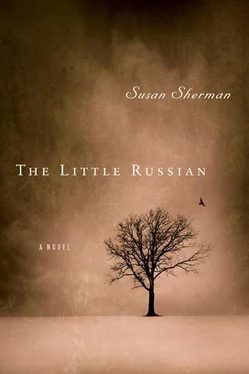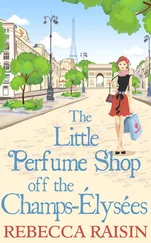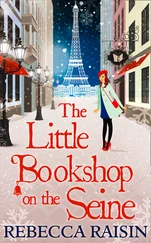For the first few hours the two women sat in amicable silence, reading their books and glancing out the window at the passing landscape. There were wheat fields of tawny stubble, haymaking stations, women in garish head scarves raking the tall shafts of grass into carts, farmhouses made of logs covered in plaster, thatched mansard roofs, and horses harnessed under great bowed yokes called dugas . Everywhere there was color: lion-colored hayricks, black earth, silver bark, red-belted tunics, embroidered shirts the color of Easter eggs, all set against a hard blue sky.
After a while the woman excused herself, got up with some difficulty, and made her way to the door. There was plenty of room in the compartment, but she was so large and her journey so precarious that she obviously thought it prudent to apologize in advance. When she was gone, Berta took the opportunity to examine the woman’s hat, left lying on the seat next to her gloves and a leather-bound book suitable for traveling. Berta knew there was much to learn from a hat. This one looked like it came from the salon of the Allschwang Brothers on the Petrovka, but on closer examination, it was easy to see that it was a well-made imitation, expensive, but not of Moscow quality. Berta didn’t have anything against imitations. They weren’t for her of course, but they were serviceable for those of a certain class. She wasn’t a snob. Quite the contrary, she was modern, forward thinking, and liberal, clearly more suited to the new century than to the last. And besides, she was in Little Russia now and had to expect that kind of thing.
By the time the woman returned, Berta had replaced the hat exactly where she had found it and was sitting back on the horsehair cushions, her feet tucked under the flounces of her skirt, pretending to read her book.
“The porters are going from compartment to compartment,” the woman said, taking her seat. “It’s never a good sign when they make an announcement in the middle of a journey.” She was a nervous sort with a motherly face and an ample bosom that rested comfortably on her midriff whenever she sat down. She kept smoothing her skirt over her prominent belly as if that would make it go away.
“I wouldn’t worry about it. It can’t be too serious. We’re still moving. If it had to do with the train or the tracks, we’d be at a standstill.”
A few minutes later there was a perfunctory knock at the door and the porter opened it without waiting for a reply. “I regret to inform you,” he said with an officious twitch of his moustache, “that there will be no fish on the menu today.”
“No fish?” the woman replied, dabbing at her moist cheeks and upper lip with a handkerchief. It was a hot day and the window was stuck.
“I’m sorry, Madame. The fish in Cherkast did not meet our standards. But we did manage to pick up a fine joint of roast beef.”
“Roast beef for lunch? No, I don’t think so. That’s all right, I’ll find something. Please don’t worry about me.”
The porter withdrew and the woman gazed forlornly out at the Dnieper River flowing patiently beside the tracks. “Can you imagine that? A whole river out there and no fish for the train. And all this time I thought this was the good line.”
Fortunately Aleksandra Dmitrievna Tretiakova was a strong woman with a healthy attitude toward life. She prided herself on eating right, getting plenty of sleep, and walking on those rare occasions when the weather permitted, so it didn’t take her long to rise above her difficulties.
“So where are you from, my dear?” she asked, plumping her pillow and putting her troubles behind her.
“Moscow.”
“I love Moscow. I’d love to live there, but my husband says the wheat is in Cherkast. You have a family? Children?”
“I live with relatives.”
“Oh,” Aleksandra Dmitrievna’s voice slid down an octave in disappointment.
Berta replaced the tooled leather bookmark and closed her book. “The Malkiels, perhaps you’ve heard of them?” She dropped this little gem as if it were of no consequence.
“The sugar Malkiels?”
“That’s right.”
“And you’re a relative you say?”
“A cousin.”
“Oh my, a cousin.” Aleksandra Dmitrievna’s doughy cheeks flushed with pleasure. “What must that be like? Living in all that splendor.” Her eyes were shining.
“It’s pleasant,” Berta said fanning herself with a cardboard fan decorated with a train, provided to all the first-class passengers by the Southwestern Line.
“Oh, I’m sure it is. Most pleasant. Heaven, I would imagine. You will tell me all about it? You’re not one of those absurdly private people are you?”
Berta smiled modestly and sat back in her seat. Maybe she had been too quick to judge this woman. And there was the long train ride ahead of them; and she was nearly finished with her novel; and to be honest, she couldn’t think of a more agreeable subject of conversation than herself. So it wasn’t long before she was telling Aleksandra Dmitrievna all about her life at Number 12 Leontievsky Street.
She told her about their horses in Petrovka Park, their box at the Bolshoi, and their salon on Tuesdays. She described her former classmates at the girls’ gymnasium, Arseniev; their prominent families; and the sensational gossip that no unmarried girl of twenty-three should know much less repeat. It wasn’t that Berta was unduly influenced by the awe, excitement, and envy so plainly displayed on Aleksandra Dmitrievna’s face—she was simply relating her life as she had been asked to do. True, she omitted a few facts pertaining to her position in that world as a distant cousin of the Malkiels’. And to be fair she might have exaggerated her relationship with the more important members of society, but weren’t these little transgressions forgivable, especially in light of the fact that she was giving Aleksandra Dmitrievna Tretiakova something to talk about for the rest of her life?
“…And all the women were wearing décolleté that evening to show off their diamonds.” Berta had moved on to the coronation ball at the Hunter’s Club in May of 1896. “Luidmila Borisovna wore a branch of them in her hair and Grafina Sergeevna had a rope of them tied around her waist. And you should’ve seen the roses, a hundred thousand of them. Then at midnight they brought in a huge replica of the Kremlin cathedral made out of red sugar. It was gigantic and took six men to carry it in. It had real doors that opened and everyone who went to the coronation said it was true down to the last detail.”
Although Berta included plenty of colorful details in her description of that famous evening, she did leave out certain inconvenient facts. For example, there was that tragedy on Khodynka Field that happened in the early morning hours of the eighteenth, when two thousand people were trampled to death by a panicked crowd of six hundred thousand who mistakenly believed the free beer was running out. When she described watching the fireworks from the club’s terrace, she also failed to mention the line of carts rumbling by in the street below and how, in the spectacular flashes of color from overhead, it was easy to see the blue-black bodies, the bloodstained tatters, the smashed noses, the eyes askew, and the many pairs of bare feet bouncing over the cobblestones. She also omitted the fact that the Malkiels were Jews and only invited to the ball because they owned the majority of sugar refineries in Russia and contributed more than three hundred Russian pounds of dyed red sugar.
Soon after that, Aleksandra Dmitrievna opened up her packages and they made a picnic out of biscuits, caviar, and wine. She slathered a biscuit with caviar, and presented it to Berta on a porcelain plate. Berta accepted it graciously, took a bite, and nodded her appreciation.
Читать дальше












